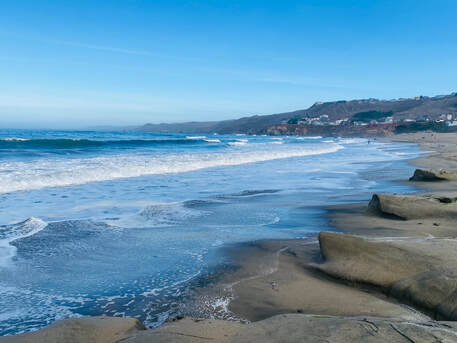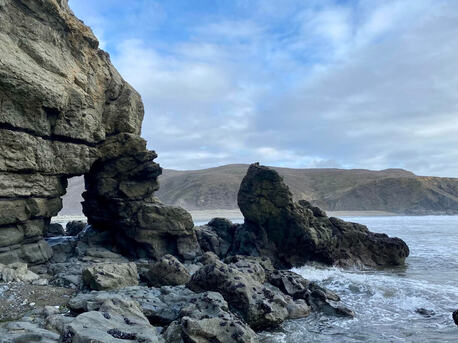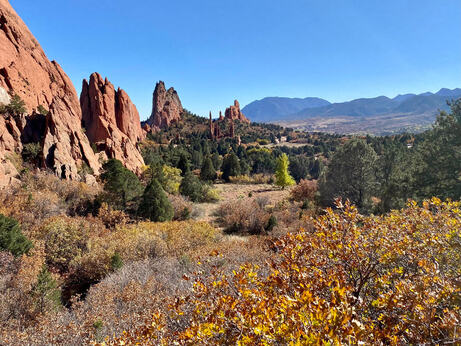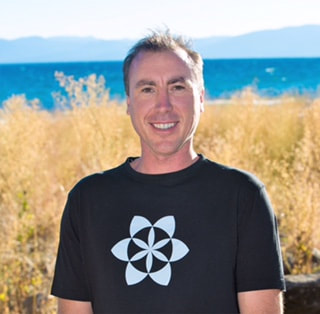|
“Paradise is not a place; it's a state of consciousness.” ~ Sri Chinmoy What is your idea of paradise? For some, it’s sitting on a pristine, white sand beach in the Caribbean, sipping on a cocktail under the shade of a palm tree. For others, it’s standing on the shore of an alpine lake at sunset, surrounded by pine trees and snowcapped mountains. We think of paradise as an ideal place where everything is perfect, all our needs are met, and there is no trouble or stress. The only problem is, as Jon Kabat-Zinn says, “wherever you go, there you are.” Many people go on vacation to escape from their stressful lives only to discover that they are still the same stressed-out person that they were at home, the only difference is that the scenery has changed. What most people don’t realize is that paradise is not a physical place so much as it is a state of mind. You can go to the most paradisical places on Earth, but getting out of your own head long enough to resonate with the beauty and perfection of your surroundings is entirely up to you.
If paradise is a state of consciousness, then what can you do to cultivate it? It begins by being aware of how you spend your time. If your life is so unbearable that you can’t wait for your next chance to take a break from it, then obviously something needs to change. As inspirational author Seth Godin would tell you, “Instead of wondering when your next vacation is, maybe you should set up a life you don’t need to escape from.” Probably the best way to find paradise is to practice being peaceful and content today. Afterall, if you are not able to let go of your stress right now, what makes you think you will be able to let it go in the future? Especially since, when that long-awaited future does finally arrive, you will inevitably find yourself in the present moment once again. So, don't fall into the trap of only living for your next vacation. While it’s nice to have something to look forward to, sacrificing your joy today only makes it more difficult to experience joy later on. Instead of dreaming about one day finding paradise on Earth, work on creating it within yourself first.
0 Comments
“Gratitude can transform common days into thanksgivings, turn routine jobs into joy, and change ordinary opportunities into blessings.” ~ William Arthur Ward This week’s quote is a timely reminder of the power of gratitude. More than just saying “thank you” after someone does a favor or service for you, gratitude is a powerful emotion that can fundamentally shift the way you experience life. It all comes down to how you view your existence here on Earth- do you see your life as a miracle or as a hassle? When you wake up in the morning, are you grateful for another day or do you feel like your life is an obligation? In other words, is life something that you want to do or is it something that you have to do? By establishing gratitude as the baseline emotion through which you experience reality, you don’t accidentally take life for granted. Regardless of what challenges the day brings, there’s always a part of you that’s just happy to be here.
However, we have only covered the first part of gratitude: feeling grateful. We haven’t even gotten to the best part: being grateful. Afterall, as author William Arthur Ward puts it, “Feeling gratitude and not expressing it is like wrapping a present and not giving it.” Think back to a time when you were truly grateful for someone or something. Remember how expansive and heart centered your energy felt? Now remember how it felt to express that gratitude. When you share your heartfelt appreciation with others, not only do you feel good inside, but so does the person that you’re thanking. So, this Thanksgiving, don’t forget to give thanks- both for your life and for the people who make it better. “You can't stop the waves, but you can learn to surf.” ~ Jon Kabat-Zinn Do you find meditation challenging? Perhaps you became interested in meditation because you thought it would help you gain control over your mind. However, when you sat down, closed your eyes, and tried your best to experience the bliss of pure consciousness, you likely found yourself distracted by a constant stream of thoughts and feelings. Instead of an expansive, oceanic experience of universal oneness, it was more like floating helplessly on the surface of an angry sea- the waves and currents tossing you around and dragging you under. This experience can be very discouraging, perhaps leading you to believe that you're doing it wrong. You might even feel like your inability to stop thinking during meditation makes you a failure. Maybe meditation is just not meant for you?
But don’t give up hope just yet! You’re being way too hard on yourself! Trying to stop your mind from creating thoughts is like trying to stop the ocean from creating waves. It’s impossible! The ocean will always generate waves- that’s what the ocean does. Likewise, the mind will always generate thoughts because that’s what the mind does- that’s what the mind is. Meditation is not so much about stopping your thoughts as it is about stopping your resistance to them. It’s not about striving for complete inner silence, it’s about training yourself to feel at ease with the passage of time- learning to breathe, relax and be at peace as time goes by. As the author Sharon Salzberg explains, “We don’t meditate to get better at meditating, we meditate to get better at life.” If you are meditating and you find yourself distracted by a thought, instead of resisting it or feeling guilty about it, ask yourself where that thought came from. Why is it coming up now? How does it make you feel inside? What is the underlying emotional energy attached to the thought that needs to be recognized and released? As the saying goes, you’ve got to feel it to heal it. By going with the wave to the source of the thought, as opposed to shutting it out, you can begin the process of healing and letting go. Now you are free to move back into the infinite stillness of the eternal now, appreciating the precious space between thoughts... until the next wave arrives. “If you think you are enlightened, go and spend a week with your family.” ~ Ram Dass As the holidays approach, it will soon be time to gather with family once again. However, most people who read this week’s quote know exactly what Ram Dass is talking about. You might be doing really well on your personal journey- you might see yourself as strong, healthy, emotionally balanced and mature. And then you get together with your family and everything falls apart. This time of year can often be emotionally challenging, mainly because spending time with family has a way of bringing out the worst in everyone. But, why does this happen? And what can you do to prevent it?
Of course, the quickest way to bring harmony to your family dynamic is by fundamentally changing every family member so that they all behave like you. Unfortunately, that’s not an option. It’s very difficult to change other people- it’s hard enough to bring positive change to your own life. Instead, you have to figure out how to love people for who they are, despite their flaws. As the writer and mystic Thomas Merton says, “The beginning of love is to let those we love be perfectly themselves, and not to twist them to fit our own image. Otherwise, we love only the reflection of ourselves we find in them.” So, next time you get together with family, see if you can prove Ram Dass wrong. That is, see if you can remain calm on the inside even when emotions start to escalate. If you do find yourself getting triggered, think of it as an opportunity to heal your past wounds instead of making those wounds worse. Most importantly, practice kindness and unconditional love towards others. Remember, it is one thing to reach a state of total inner peace while you are alone on your meditation cushion, but the real challenge is maintaining that inner peace when faced with difficult circumstances. “I learned that courage was not the absence of fear, but the triumph over it. The brave man is not he who does not feel afraid, but he who conquers that fear.” ~ Nelson Mandela What are you afraid of? According to this week’s quote, courageous people still experience fear, they’re just able to conquer it. Which all sounds great, but how exactly do you conquer fear? It starts by understanding and accepting fear as a valid emotion. Everyone feels fear at some point in their lives, it is the body’s natural response to a perceived threat. Imagine, for example, that you are on hike and you almost step on a snake. Your whole system will automatically go into a fight, flight or freeze response. Similarly, you might feel a flash of fear when you hear about a new wave of layoffs coming up at work. In both cases, it is your basic safety and security that is being threatened. The threat of loss is also responsible for a great deal of fear. Whether it’s the fear of losing your money, your health, your sanity, your loved ones, your freedom, or your life- it’s all based on a similar threat of loss.
Since avoiding fear is not really an option, what can you do to overcome it? One way is by comparing fear with its opposite emotion, which is love. Whereas fear feels like having ice-cold water inside your guts, love feels more like drinking a hot cup of cocoa- an inner warmth slowly spreading from your chest throughout your whole body. Fear feels tight, closed and rigid compared to love, which is more of a soft, comfortable, open feeling. When you are afraid, you hold your breath in anticipation of what will happen next. When you are in love, you breathe freely and focus your awareness in the present moment. As the saying goes, only love can overcome fear. So, the next time you feel afraid, take a moment to feel all the physical sensations associated with that fear. Then, with full awareness, let that cold internal feeling melt into the warmth of your love. Doing so may not directly eliminate the perceived threats to your safety or security, but it will help you have courage in the face of adversity. |
Like what you are reading? Sign-up here for our weekly newsletter featuring a new inspirational blog every Wednesday.
About The AuthorNick Hughes is a massage therapist, yoga instructor and co-owner of Well Being. Influenced by the ideas of Alan Watts, Eckhart Tolle, Ram Dass, and Deepak Chopra, Nick presents his unique take on human existence with the goal of helping others live a happier life. Archives
July 2024
Categories |







 RSS Feed
RSS Feed